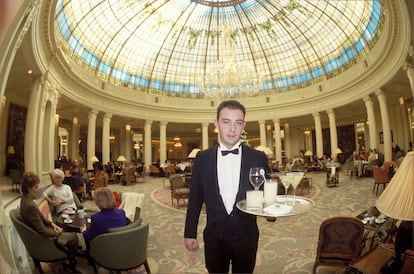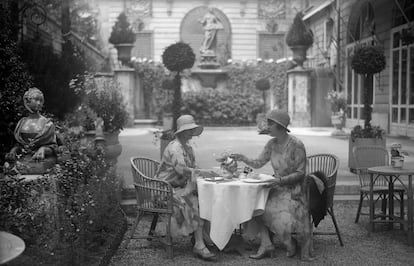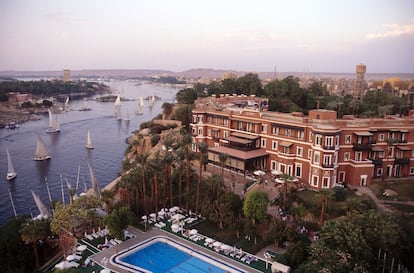Hotel life: Luxuries of a bygone era
Oscar Wilde, Ernest Hemingway, Julio Camba and Agatha Christie – some of the world’s most brilliant writers did their best work in hotel rooms


The bell at the reception desk had been silent for months, so the hotel decided to reinvent itself. When Spanish hotels saw their occupancy rates drop by 70% during the pandemic, they looked to the past for new business models. Years ago, hotels used to be part of the national housing ecosystem, offering a flexible living arrangement for long-term guests from all walks of life. Some hotel chains began enticing digital nomads and travelers with $500 monthly rates for what had once been just a pipe dream – the opportunity to live more or less permanently in a hotel. But as the pandemic eased, the mirage began to vanish. Remote workers were called back into offices and life got back to the old normal.
There is something appealing about hotel life. Everyone can imagine how nice it would be to return home every day and find a freshly made bed with the sheets invitingly turned down. But few can afford it. With an average daily rate of US$105 for a hotel room in Spain, a full month’s stay costs about US$3,150. This is more than four times the average rent in Spain. Living in a hotel does not make financial sense, not matter how well off the guest may be. But during the pandemic, hotels found other reasons to adopt new business models.
“The Palace Hotel was a meeting place for the upper classes,” says Paloma García, head of marketing at the legendary Madrid hotel. “Communication used to be more difficult – if you wanted to mingle in certain social circles, people had to know where you were.” And if you were somebody, the Palace was the place to be. European nobles were often spotted enjoying the Neptune Grill’s French cuisine and baroque aesthetic. After lunch, the ladies socialized with their peers playing cards while the gentlemen smoked cigars and sipped cognac. Five-star hotels like the Palace and the nearby Ritz Madrid were the social networking platforms of old for the upper class to show off their fusty pedigrees.
But things have changed. “Staying in touch is easier now and people don’t have to go to places like these to socialize,” said García. When she started working at the Palace (now the Westin Palace Hotel) in the 1990s, only one woman was still living there full-time. No one else has taken up permanent residence at the hotel since she left. There’s no need – if you want to show off, just order a gin and tonic at the rooftop bar and immortalize the moment by posting a selfie on social media.

Hotel life used to have certain advantages. Guests could bring their own servants and enjoy luxuries that were not widely available. The grand hotels were equipped with the most modern appliances and the latest technological advances. When the Savoy in London opened in 1889, it was the first British hotel to have electric lighting, elevators, hot water and a bathroom in every room. But when these domestic luxuries became more widespread, hotels lost their appeal as permanent residences.
New competitors have emerged. Stays of longer than a month represent 25% of all Airbnb bookings. Apart-hotels with short-term leases, furnished rooms and shared services provide many of the advantages once offered by residential hotels, as do university and senior living facilities.
When celebrities were the stars of the hotel
Long gone are the days when nobles gathered in the tea rooms of five-star hotels, but the legends endure. Many of the most famous celebrities of the 20th century lived in hotels. Coco Chanel, who lived in the Paris Ritz for more than 30 years, decorated her room with lacquered lampshades, gilded mirrors and a velvet banquette. Oscar Wilde also lived out his days in a Parisian hotel, although in less opulent circumstances. Agatha Christie lived in many of the world’s best hotels, and wrote about them in her mystery novels. The Queen of Crime wrote Murder on the Orient Express in room 411 of the Pera Palace in Istanbul, a hotel overlooking the city’s Golden Horn where Europe’s crème de la crème rested after the mythical train ride. Christie’s Death on the Nile begins with detective Hercule Poirot strolling through another of her favorites – Egypt’s Old Cataract Hotel.

Renowned Spanish journalist Julio Camba wrote his final columns in room 383 at the Palace, and Ernest Hemingway reported on the Spanish Civil War from the celebrated Hotel Florida in Madrid. “The door of my room is open. You can hear gunfire at the front, a few blocks from the hotel. Rifle shots all night. Machine gun fire. I’m lucky to be lying in bed instead of in Carabanchel or University City [districts of Madrid],” he wrote as the city was under siege by Franco’s troops.
The Florida Hotel became the residence of many foreign correspondents and writers like American author John Dos Passos, who immortalized his stay in an article called Room and Bath at the Hotel Florida, published by Esquire magazine in January 1938. “My room is seven or eight stories up. The hotel is on a hill. From the window I can look out at all the old part of Madrid over the crowded tile roofs… The packed city stretches out sharp and still as far as I can see, narrow roofs, smokeless chimneypots, buff-colored towers and the pointed slate spires of seventeenth century Castile.” Designed by architect Antonio Palacios, the Florida Hotel survived more than 30 artillery shells that crashed into its majestic marble façade, but it didn’t survive urban development. Galerías Preciados bought and demolished the building in the 1960s to build a shopping center with a brick facade that is now covered by huge LED screens. The building is currently owned by a department store – El Corte Inglés – and hordes of tourists crowd the top-floor restaurants to enjoy a view very similar to the one described by Dos Passos.
These anecdotes gave rise to the romantic notion idea that artists did their best work in hotel rooms because art has no time for mundane chores like housework and shopping. But it’s a false narrative that idealizes a lifestyle spun from the cloth of storytellers. “To be honest, it [hotel life] is more the stuff of literature and movies,” said Carlos Larrinaga, a professor (University of Granada, Spain) and author of a history of Spanish tourism and hotels during the first half of the 20th century.
Larrinaga explains that in Spain, “The development of the hotel industry is closely linked to the growth of tourism.” More hotels were built as tourism grew and became an important component of the nation’s economy. Since short stays were more profitable than long ones, this became the predominant model for attracting affluent foreign tourists since the 1970s.
Tourism is the biggest contributor to the Spanish economy, accounting for more than US$176 billion a year (14.6% of GDP), according to a report by the World Travel & Tourism Council. Hotels are very important to Spain’s economy, as evidenced by the Madrid boom that has seen recent new openings of the Four Seasons Hotel and The Madrid EDITION, as well as major renovations of old classics like the Ritz, the Santo Mauro and the Rosewood Villamagna.
Spanish hotels were never used as permanent residences in the same manner as other countries like the United States. “It was more common for the wealthier strata of society to spend a few months in hotels,” said Larrinaga, “but living permanently in a hotel is rare.” Yet being the exception has attracted hotel dwellers for decades and become the fodder of legends.
In his book Hotel Nirvana, Manuel Leguineche writes, “An entire life can unfold in hotels – from birth to death.” While few choose to live this way, it’s undeniable that hotels still fascinate many. Perhaps because vacation stays are wrapped in the idea of ephemeral luxury, of a happiness with an expiration date. It’s seductive to dream of a life in which breakfasts are always a buffet, the hairdryer is always within reach, the linens are always clean, and the temperature is always just right – to live a never-ending vacation until you check out of this world.
Tu suscripción se está usando en otro dispositivo
¿Quieres añadir otro usuario a tu suscripción?
Si continúas leyendo en este dispositivo, no se podrá leer en el otro.
FlechaTu suscripción se está usando en otro dispositivo y solo puedes acceder a EL PAÍS desde un dispositivo a la vez.
Si quieres compartir tu cuenta, cambia tu suscripción a la modalidad Premium, así podrás añadir otro usuario. Cada uno accederá con su propia cuenta de email, lo que os permitirá personalizar vuestra experiencia en EL PAÍS.
¿Tienes una suscripción de empresa? Accede aquí para contratar más cuentas.
En el caso de no saber quién está usando tu cuenta, te recomendamos cambiar tu contraseña aquí.
Si decides continuar compartiendo tu cuenta, este mensaje se mostrará en tu dispositivo y en el de la otra persona que está usando tu cuenta de forma indefinida, afectando a tu experiencia de lectura. Puedes consultar aquí los términos y condiciones de la suscripción digital.








































